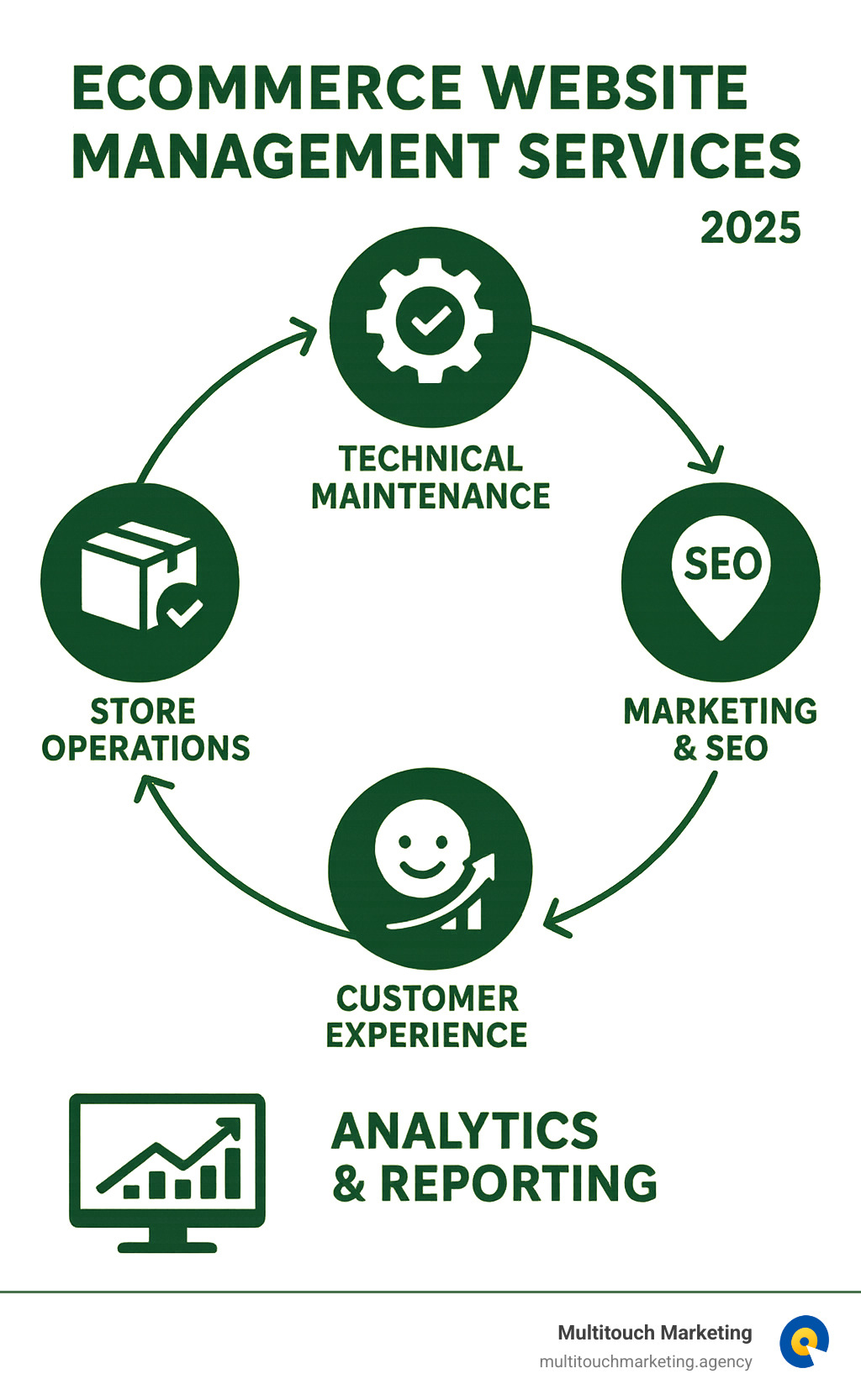More Than Just an Online Storefront
Ecommerce website management services cover the ongoing technical maintenance, marketing, and operational support for a successful online store. They extend beyond basic hosting to include security monitoring, performance optimization, inventory management, and conversion rate optimization.
What Ecommerce Website Management Services Include:
- Technical Maintenance: Security updates, performance monitoring, backup management, and bug fixes
- Store Operations: Product catalog management, inventory synchronization, and order processing
- Marketing & SEO: Search engine optimization, PPC campaigns, and conversion optimization
- Customer Experience: UX improvements, checkout optimization, and support integration
- Analytics & Reporting: Performance tracking, sales analysis, and strategic recommendations
The numbers tell the story. With U.S. retail eCommerce sales projected to surpass $768 billion and competition growing, a successful online store needs more than a pretty design.
Running an ecommerce business means managing a complex digital ecosystem. Website security, search rankings, customer experience, inventory sync, and marketing campaigns all demand specialized expertise.
Many owners try to handle it all, but as one industry expert noted, “Good website designers are artists, not business managers. It takes a different mindset and approach to make a website work for a business after it’s built.”
That’s where professional ecommerce management comes in. These services free you to focus on what you do best—developing products and growing your business—while experts handle the technical complexity.
I’m Milton Brown, and with over 16 years of experience helping businesses scale with data-driven strategies, I’ve seen how professional management transforms online stores into profitable growth engines.
The Pillars of Comprehensive Ecommerce Management
To thrive online, an ecommerce website needs constant care across many areas. We break down the core activities involved in managing a successful online store into key essential pillars.
Technical Health & Maintenance
Just like a high-performance vehicle, your ecommerce website needs regular tune-ups to prevent breakdowns. Our ecommerce website management services prioritize the technical health of your site.
This includes rigorous Website Maintenance and Support for smooth operations. We manage website security with the latest protection methods, regular checks, and constant threat monitoring to protect customer data and fix vulnerabilities proactively.
Site performance is key, as slow pages hurt business. We perform speed optimization by compressing images and files and improving code to ensure fast load times. We also monitor uptime to keep your store open for business, because every minute of downtime means lost sales.
Regular on-site and off-site backups are essential for data safety, allowing for quick restoration if needed. We handle critical CMS updates and security patching for your platform and plugins, ensuring you have the latest features with fewer risks. Fast bug fixes maintain a smooth user experience, and following Website Maintenance Best Practices keeps your site in top shape.
Store Operations & Catalog Management
Beyond the technical aspects, the day-to-day running of your store is crucial for ensuring your products are well-presented and your sales process is seamless.
Managing your product catalog is an ongoing task. We efficiently handle uploading new products with correct details, including names, SKUs, images, and prices. We also manage regular price updates and product description optimization to keep listings current and engaging, supported by organized SKU management.
Inventory synchronization is vital for multi-channel sales, preventing out-of-stock issues by matching inventory across all platforms. We can integrate tools like cloud-based order management systems to streamline this process.
We streamline order processing and fulfillment coordination by planning orders and providing details to warehouses for fast shipping. We provide robust order tracking and use predictive analysis to avoid stock-outs. Good data management ensures accuracy across your entire system.
Growth Marketing & SEO
Having a technically sound and well-stocked store is only half the battle; customers need to be able to find it. This pillar focuses on driving traffic and converting visitors into loyal customers.
Search Engine Optimization is crucial for visibility. We implement on-page SEO (optimizing descriptions and tags), technical SEO (fixing indexing issues), and strategic link building to improve search rankings and drive organic traffic. A fast-loading site also gets an SEO boost from Google.
PPC Pay Per Click Campaigns offer instant visibility. As PPC experts, we go beyond budget setting to perform deep keyword research, write compelling ad copy, and use smart bidding. We manage campaigns on Google Shopping, Amazon, and other platforms to reach ready-to-buy customers and turn ad spend into predictable sales. For instance, Amazon’s brand ads can convert three times better than Google Shopping Ads, highlighting the importance of a multi-platform strategy.
Our Data Driven Marketing Strategies include social media and email marketing, where we create promotional graphics and manage newsletters. Conversion Rate Optimization (CRO) is integrated into all efforts, improving the user experience to boost sales and ensure every marketing dollar contributes to your bottom line.
Customer Experience (CX) & Engagement
A great product and clever marketing may bring customers to your site, but their on-site experience determines if they buy and return. This pillar is focused on making that experience exceptional.
Effective user experience (UX) design is critical. A site must be easy to steer. We optimize the entire customer journey, especially the checkout process, to remove friction and reduce lost sales.
With the rise of mobile shopping, Responsive Web Design Services are essential. Your site must function perfectly on all devices to provide a consistent, positive experience.
Customer support integration, including live chat management, email, and phone help, is a key part of CX. Easy returns and refunds build trust and loyalty. We also manage customer feedback to help you improve your offerings.
Finally, personalization is key. Through A/B testing and customer feedback analysis, we tailor the experience with features like product recommendations and loyalty programs. A great customer experience accelerates growth, while a poor one drives customers away.
The Business Case for Outsourcing Ecommerce Website Management Services
As your business grows, managing it can become overwhelming. This is where professional ecommerce website management services step in. Let’s explore the benefits and signs that it might be time to partner with an expert.
Key Benefits of Outsourcing
Handing over your ecommerce management to a dedicated team offers numerous advantages that allow you to grow your business without operational headaches.
Gain immediate access to expertise by tapping into a team with deep knowledge across all facets of ecommerce, from technical development to advanced marketing. Providers like Multitouch Marketing bring 15+ years of experience, so you’re getting seasoned pros.
Outsourcing offers significant cost efficiency. Hiring a full in-house team of specialists is expensive. Outsourcing provides these specialized services at a fraction of the price, dramatically reducing operational overhead.
Entrusting website management to professionals allows you to focus on your core business. This frees up your time to develop products, nurture customer relationships, and guide your company’s strategic direction.
Outsourced services provide incredible scalability. They can flex support up or down based on your business needs, whether you’re in a boom or a quiet period, without the complexities of hiring or firing staff.
Experts work to ensure your site runs at its peak, leading to improved performance. Continuous optimization for speed, security, and UX translates directly to higher conversion rates and more sales. They also offer proactive problem-solving, identifying and fixing issues before they impact customers.
Outsourcing leads to reduced overhead by eliminating hidden costs like benefits, office space, and training. Furthermore, with dedicated cybersecurity teams, they often provide improved security beyond what most businesses can achieve internally, giving you priceless peace of mind.
Signs Your Business Needs Professional Help
How do you know it’s time to bring in the pros? Here are clear indicators that your business could benefit from expert ecommerce website management services:
- Sales are flat or declining: Your revenue is stagnant despite your efforts, signaling underlying issues with site performance, marketing, or user experience.
- Your website is slow or crashes frequently: A sluggish or broken site frustrates customers and hurts search rankings. If your performance scores are low, you’re losing business.
- You lack time for updates: Outdated product listings, missed promotions, or a neglected blog tell customers you’re not keeping up, and they may go elsewhere.
- You have security concerns or have experienced breaches: If you’ve been hacked or live in fear of it, your customer data and reputation are at risk. This is not a DIY task.
- You’re receiving poor customer feedback: Complaints about difficult navigation or a frustrating checkout process are red flags for a poor user experience.
- You’re overwhelmed by technical tasks: If you spend more time troubleshooting plugins than focusing on your business, you’re losing valuable time and energy.
- Your marketing efforts aren’t generating ROI: If your ad spend isn’t delivering results, you need strategic optimization to make your marketing dollars work harder.
How professional management improves your ROI
Professional ecommerce website management services are a strategic investment designed to boost your bottom line.
By optimizing the user experience, streamlining checkout, and ensuring fast site speed, management services create increased conversion rates. We’ve seen clients achieve a 36% increase in conversion rates by refining these elements.
Through strategies like cross-selling, upselling, and personalized recommendations, experts can achieve a higher Average Order Value (AOV). We’ve seen AOV jump by 22% for some clients.
A seamless experience and effective marketing foster loyalty, leading to improved Customer Lifetime Value (CLV) and more repeat purchases. This also leads to reduced cart abandonment by smoothing out the checkout process.
Consistent SEO efforts lead to better search engine rankings, attracting more organic traffic and reducing your reliance on paid ads. We’ve seen traffic boosts of 15% from optimized SEO strategies alone.
Outsourcing leads to lower operational costs by eliminating the need for a large in-house team. It also provides robust analytics for data-driven decision making, ensuring every strategy is optimized for maximum impact. We help you track key metrics like ROAS and LTV-to-CAC ratio to ensure long-term success.
How to Choose the Right Ecommerce Management Partner
Selecting the right partner is critical. You need a team that understands your business goals and can become an extension of your own efforts. Here’s what to look for when choosing your partner for ecommerce website management services.
What to look for in an ecommerce website management services provider
Look for a company with a proven track record and extensive experience. Ask for proof of how they’ve boosted sales or conversions for other clients. Top providers often have 15+ years of experience.
Review their case studies for specific results, like a 63% revenue jump for a past client. Read client testimonials to gauge their expertise, efficiency, and communication.
Technical expertise is crucial. Ensure they are proficient with your ecommerce platform, whether it’s Shopify, WooCommerce, Magento, or BigCommerce. Certified experts can offer the best solutions.
Look for a clear communication style and regular updates. A dedicated contact and reporting transparency are key. You should receive clear monthly reports on your key performance indicators (KPIs) to understand your ROI.
Finally, confirm they support your chosen platforms. Our Raleigh, NC team at Multitouch Marketing, for example, has deep experience with various platforms. The best partners offer a holistic approach, providing strategic advice on new features, market trends, and growth. For more tips, see our guide on the Best Website Maintenance Companies.
Understanding Common Pricing Models
The cost for ecommerce website management services varies. Understanding common pricing models will help you choose the best fit for your budget and goals.
Here’s a quick look at how providers typically charge:
| Pricing Model | Description | Pros | Cons |
|---|---|---|---|
| Retainer Model | You pay a fixed monthly fee for a set number of services or a certain amount of time. | Makes budgeting easy, gives you ongoing support, and helps prevent problems before they start. Often includes many services, like 6 bug fixes or content updates each month. | You might not use every service every month, and it can feel less flexible if your needs change a lot outside the agreed scope. |
| Hourly Rates | You pay for the actual time spent on tasks, usually between $30 to $50 per hour, depending on how complex the work is. | Very flexible – you only pay for what you use. Great for small, one-off jobs or when you’re not sure how much work you’ll need. | Costs can add up quickly if tasks are complicated or take a long time. It can also make budgeting less predictable, as you need to watch the hours closely. |
| Project-Based Pricing | You pay a fixed price for a specific project that has a clear goal, like a website redesign or adding a new feature. | You know the full cost upfront for a specific piece of work. Perfect for big, one-time tasks. | Not ideal for ongoing maintenance. If the project grows beyond the original plan, you might pay extra. It also might not cover unexpected issues that pop up. |
| Performance-Based Fees | Your payment is linked to how well the service performs. For example, you might pay a percentage of extra sales or a fee for each new customer they help you get. | This model means the provider’s goals are directly tied to your business success, which can lead to a great return on your investment. | Can be tricky to set up and track. You often need to know your current performance first. This model is also often combined with a basic monthly fee. |
Some providers offer tiered plans with different service levels, with prices ranging from around $77.40/month to $179.40/month. Consider your specific needs and the value you’ll receive. You can also review typical WordPress Maintenance Cost for more context.
Frequently Asked Questions about Ecommerce Management
It’s natural to have questions when considering an expert partner for your online store. Here are some of the most common questions we receive about our ecommerce website management services.
How do management services handle website security?
We take a multi-layered approach to website security. This starts with continuous monitoring to detect suspicious activity and potential threats. We apply regular updates and patches to all software and plugins to close security gaps.
We also conduct thorough security audits to find hidden risks and perform malware scanning to remove harmful code. To create a strong defense, we implement firewalls and intrusion detection systems. For payment processing, we ensure strict PCI DSS compliance to protect sensitive customer data. Our approach is proactive and vigilant to keep your store safe.
What ecommerce platforms do you typically support?
Most reputable ecommerce website management services, including ours, are well-versed in a wide range of popular platforms to meet your unique needs.
We commonly work with major players like:
- Shopify: A user-friendly and scalable favorite for many businesses.
- WooCommerce (for WordPress): A powerful, flexible, and highly customizable open-source option.
- Adobe Commerce (formerly Magento): A robust, feature-rich platform for larger businesses needing extensive customization.
- BigCommerce: A strong contender with comprehensive features for growing businesses.
Beyond these, we also have experience with platforms like Wix, Squarespace, and custom-built solutions. We adapt our skills to your technology to ensure your store is managed effectively.
How quickly can I expect issues to be resolved?
Response and resolution times are defined in a Service Level Agreement (SLA). This is our promise to you.
For critical issues, like a site-down emergency or a security breach, we provide an immediate response, with work beginning within the hour, 24/7.
For high-priority issues, such as a broken checkout process, we typically respond within a few hours, with a resolution plan within 24 hours.
For minor bugs or routine requests, we usually respond within 24 hours, and the fix is completed within 24-48 hours or scheduled into a weekly work cycle. We ensure you’re always kept in the loop through a dedicated support manager and your preferred communication channels.
Conclusion: Partnering for Sustainable Growth
Running an online store is an ongoing journey, not a one-time setup. True ecommerce success requires consistent care. Your digital storefront must be secure, fast, and optimized for growth.
This is where professional ecommerce website management services shine. They handle the technical complexities and digital marketing, freeing you to focus on what you love: developing products, connecting with your customers, and growing your business.
Ready to transform your online store into a profitable powerhouse? You don’t have to do it alone. Partner with experts who understand the digital world. Find out how Multitouch Marketing’s expert Website Management Companies can lift your online presence and help you achieve sustainable growth.




